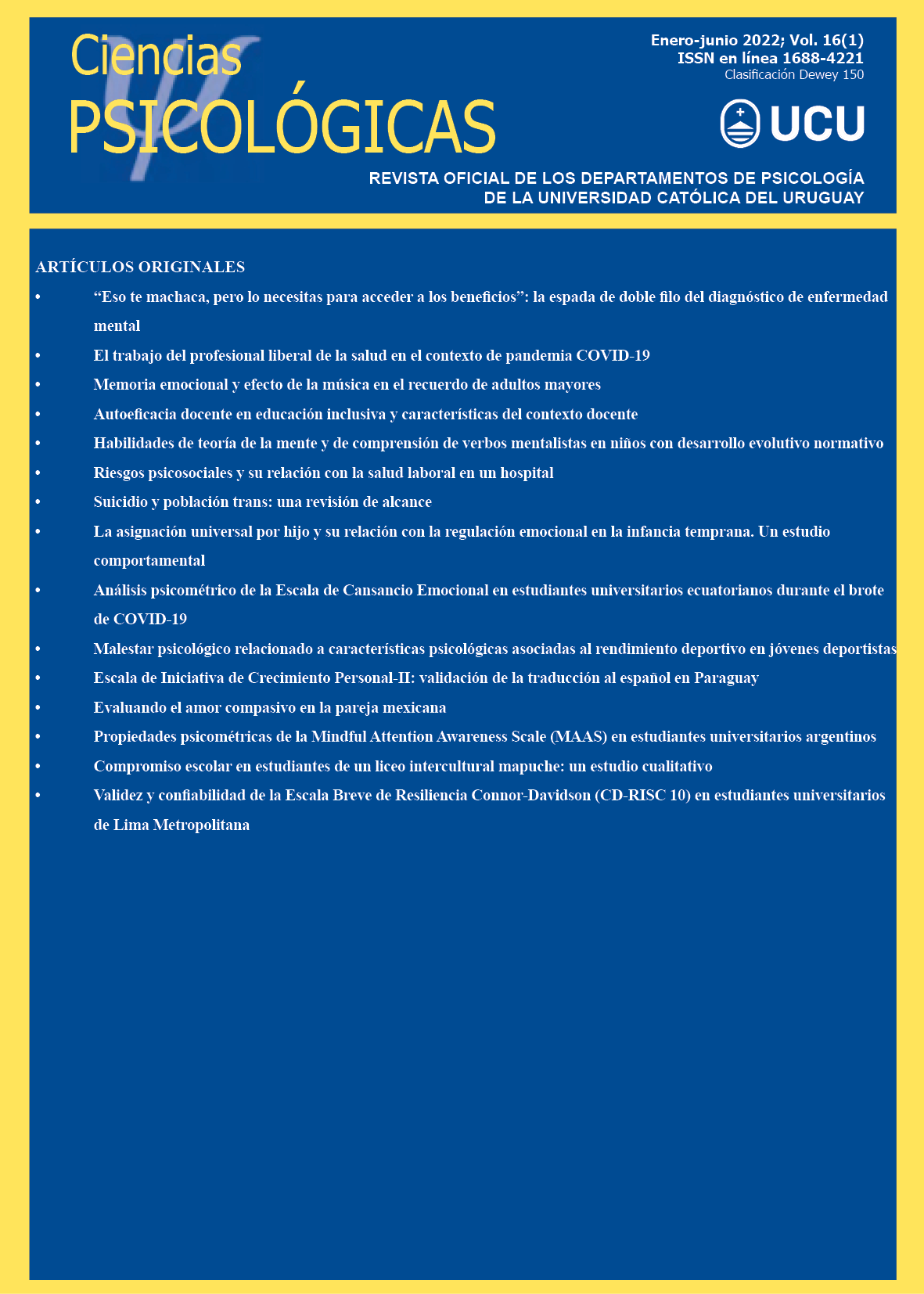Autoeficácia docente na educação inclusiva e características do contexto de ensino
DOI:
https://doi.org/10.22235/cp.v16i1.2436Palavras-chave:
autoeficácia, inclusão escolar, docenteResumo
O objetivo deste estudo foi descrever a associação da autoeficácia de professores em práticas educacionais inclusivas com variáveis do contexto de ensino e características dos docentes. Participaram 193 professores da educação básica, sendo 77,72 % do sexo feminino e 22,28 % do sexo masculino de escolas particulares, confessionais e públicas estaduais localizadas nos municípios de Belém e Castanhal, Pará, Brasil. Foram aplicados os instrumentos de caracterização e a escala de eficácia de professores em práticas educacionais inclusivas. As técnicas de análise de dados foram a análise fatorial e a análise de correspondência. Dentre os resultados encontrados, verificaram-se as associações entre as variáveis investigadas, o que sugere que ao julgar a própria capacidade em práticas educacionais inclusivas, o professor considera alguns fatores presentes no contexto e em sua trajetória docente. Espera-se que este estudo possa contribuir com o estímulo a formação continuada de professores no contexto inclusivo.
Downloads
Referências
Bandura, A. (1997). Self-self efficacy: The exercise of control. W. H. Freeman/Times Books/ Henry Holt & Co.
Bandura, A. (2008). Reconstrual of "free will" from the agentic perspective of social cognitive theory. In J. Baer, J. C. Kaufman, & R. F. Baumeister (Eds.), Are we free? Psychology and free will (pp. 86-127). Oxford University Press. https://doi.org/10.1093/acprof:oso/9780195189636.003.0006
Bzuneck, J. A. (2017). Crenças de autoeficácia de professores: um fator motivacional crítico na educação inclusiva. Revista Educação Especial, 30(59), 697-708. https://doi.org/10.5902/1984686X28427
Cardona-Molto, M. C., Ticha, R., & Abery, B. H. (2020). The Spanish Version of the Teacher Efficacy for Inclusive Practice (TEIP) Scale: Adaptation and Psychometric Properties. European Journal of Educational Research, 9(2), 809-823. https://doi.org/10.12973/eu-jer.9.2.809
Carew, M. T., Deluca, M., Groce, N., & Kett, M. (2019). The impact of an inclusive education intervention on teacher preparedness to educate children with disabilities within the Lakes Region of Kenya. International Journal of Inclusive Education, 23(3), 229-244. https://doi.org/10.1080/13603116.2018.1430181
Dimitrios, S., Foteini, C., Harilaos, Z., Victoria, Z., & Panagoula, P. (2020). Self-efficacy of special education teachers in Greece. European Journal of Education Studies, 7(4), 150-160. https://doi.org/10.5281/zenodo.3809401
Fávero, L. P., Belfiore, P., Silva, F. D., & Chan, B. L. (2009). Análise de dados: modelagem multivariada para tomada de decisões. Elsevier.
Kiel, E., Braun, A., Muckenthaler, M., Heimlich, U., & Weiss, S. (2019). Self-efficacy of teachers in inclusive classes. How do teachers with different self-efficacy beliefs differ in implementing inclusion? European Journal of Special Needs Education, 35(3), 1-17. https://doi.org/10.1080/08856257.2019.1683685
Martins, B. A. & Chacon, M. C. M. (2020). Escala de eficácia docente para práticas inclusivas: validação da Teacher efficacy for inclusive Practices (TEIP) scale. Revista Brasileira de Educação Especial, 26(1), 1-16. https://doi.org/10.1590/s1413-65382620000100001
Morettin, P. A. & Bussab, W. O. (2017). Estatística básica. Saraiva Educação SA.
Nina, K. C. F., Silva, S. S. da C., & Pontes, F. A. R. (2020). Adaptação transcultural do The Teacher Efficacy for Inclusive Practices (TEIP): versão brasileira. Ciencias Psicológicas, 14(1), e-2175. https://doi.org/10.22235/cp.v14i1.2175
Nuri, C., Demirok, M. S., & Direktör, C. (2017). Determination of Self-efficacy and Burnout State of Teachers Working in the Special Education Field in Terms of Different Variables. Journal of Education and Training Studies, 5(3), 160. https://doi.org/10.11114/jets.v5i3.2237
Özokcu, O. (2017). Investigating the relationship between teachers’ self -efficacy beliefs and efficacy for inclusion. European Journal of Special Education Research, 2(6), 234-252. https://doi.org/10.5281/zenodo.1133784
Özokcu, O. (2018). Investigating preschool teachers’ self-efficacy in inclusion practices in Turkey. International Education Studies, 11(9), 79. https://doi.org/10.5539/ies.v11n9p79
Ramos, M. F. H., Pontes, F. A. R., Silva, S. S. D. C., Ramos, E. M. L., Casanova, D. C. G., & Azzi, R. G. (2018). Characterization of basic education teachers based on the social cognitive model of job satisfaction. Paideia, 28(69), 1-8. https://doi.org/10.1590/1982-4327e2811
Sharma, U., Loreman, T., & Forlin, C. (2012). Measuring teacher efficacy to implement inclusive practices. Journal of Research in Special Educational Needs, 12(1), 12-21. https://doi.org/10.1111/j.1471-3802.2011.01200.x
Song, J. (2016). Inclusive Education in Japan and Korea – Japanese and Korean Teachers’ Self-Efficacy and Attitudes towards Inclusive Education. Journal of Research in Special Educational Needs, 16, 643-648. https://doi.org/10.1111/1471-3802.12324
Tschannen-Moran, M. & Hoy, A. W. (2001). Teacher efficacy: capturing an elusive construct. Teaching and Teacher Education, 17(7), 783-805. https://doi.org/10.1016/S0742-051X(01)00036-1
Tschannen-Moran, M. & Hoy, A. W. (2007). The differential antecedents of self-efficacy beliefs of novice and experienced teachers. Teaching and Teacher Education, 23(6), 944-956. https://doi.org/10.1016/j.tate.2006.05.003
Tschannen-Moran, M., & Johnson, D. (2011). Exploring literacy teachers’ self-efficacy beliefs: Potential sources at play. Teaching and Teacher Education, 27(4), 751-761.
Tschannen-Moran, M., Hoy, A. W., & Hoy, W. K. (1998). Teacher efficacy: Its meaning and measure. Review of Educational Research, 68(2), 202-248. https://doi.org/10.3102/00346543068002202
Tümkaya, G. S., & Miller, S. (2020). The perceptions of pre and in-service teachers’ self-efficacy regarding inclusive practices: A systematised review. Elementary Education Online, 19(2), 1061-1077. https://doi.org/10.17051/ilkonline.2020.696690
Yada, A. & Savolainen, H. (2017). Japanese in-service teachers’ attitudes toward inclusive education and self-efficacy for inclusive practices. Teaching and Teacher Education, 64, 222-229. https://doi.org/10.1016/j.tate.2017.02.005
Yada, A., Tolvanen, A., & Savolainen, H. (2018). Teachers’ attitudes and self-efficacy on implementing inclusive education in Japan and Finland: A comparative study using multi-group structural equation modelling. Teaching and Teacher Education, 75, 343-355. https://doi.org/10.1016/j.tate.2018.07.011
Yada, A., Tolvanen, A., Malinen, O. P., Imai-Matsumura, K., Shimada, H., Koike, R., & Savolainen, H. (2019). Teachers’ self-efficacy and the sources of efficacy: A cross-cultural investigation in Japan and Finland. Teaching and Teacher Education, 81, 13-24. https://doi.org/10.1016/j.tate.2019.01.014
Downloads
Publicado
Como Citar
Edição
Secção
Licença
Direitos de Autor (c) 2022 Universidad Católica del Uruguay

Este trabalho encontra-se publicado com a Licença Internacional Creative Commons Atribuição 4.0.
















